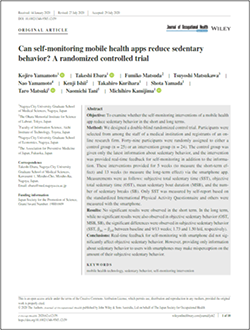#0076 Can self-monitoring mobile health apps reduce sedentary behavior? A randomized controlled trial

Modern Solutions: Can a Mobile Health App Help Fight Sedentary Behavior?
An overly sedentary lifestyle is now widely recognized as one of the leading risk factors of many diseases, including metabolic and cardiovascular disorders. Thus, it has become a worldwide health challenge to spread information about the risks of sedentary behavior and promote more active lifestyles.
However, gathering long-term data on sedentary behavior is tricky. On one hand, subjective data reported by study participants themselves are not always reliable, as people tend to underestimate how much time they actually spend sitting down each day. On the other hand, collecting objective data necessarily involves a measuring device, which usually comes in the form of a portable accessory with an accelerometer or step counter. When users are aware that they are carrying such devices, they might behave differently than normal.
Considering that both types of data collection have strengths and weaknesses, it is important to conduct studies in which both types are gathered simultaneously. Thus, in our work, we performed short- and long-term experiments (5 and 13 weeks, respectively) to check if a mobile health app could help reduce sedentary behavior by collecting objective and subjective behavior data.
We randomly divided 49 participants into a control group and an intervention group. All participants installed a custom app on Android smartphones and received information regarding sedentary behavior, but only those in the intervention group received real-time feedback and notifications about their sedentary behavior.
Though we hoped participants in the intervention group would show a reduction in sedentary behavior thanks to the app, we found no significant improvements in the objective data. In contrast, subjective data indicated that users underestimated, in the long term, the extent of their sedentary behavior; they believed there was an improvement although objective measurements told otherwise. It is possible that the preliminary information about sedentary behavior given to all participants caused misperceptions about their own behavior.
As one of the first studies to evaluate the impact of self-monitoring mobile apps on sedentary behavior, our results should contribute to the limited available knowledge on this matter, even though the mobile health app did not show significant results. Hopefully, our work will help future researchers develop better strategies to promote more active lifestyles.

Link to the original journal article:
https://onlinelibrary.wiley.com/doi/10.1002/1348-9585.12159
Title of the paper:
Can self-monitoring mobile health apps reduce sedentary behavior? A randomized controlled trial
Authors:
Kojiro Yamamoto, Takeshi Ebara, Fumiko Matsuda, Tsuyoshi Matsukawa, Nao Yamamoto, Kenji Ishii, Takahiro Kurihara, Shota Yamada, Taro Matsuki, Naomichi Tani, Michihiro Kamijima




